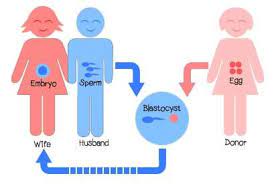Donor Eggs

Donor Eggs
If a couple cannot be helped through procedures such as in vitro fertilization, they may want to consider using donor eggs. Donor eggs — and sometimes donor embryos — allow an infertile woman to carry a child and give birth. You might be a candidate for donor eggs if you have any of these conditions:
- Premature ovarian failure, a condition in which menopause has started much earlier than usual, typically before age 40
- Diminished ovarian reserve, meaning that the eggs that you have are of low quality; this can often be caused by age, because fertility drops off steeply after 40.
- Genetically transmitted diseases that could be passed on to your child
- A previous history of failure with IVF, especially when your doctor thinks that the quality of your eggs may be the problem
The use of donor eggs is becoming more common, especially among women over 40. In 2010, about 11% of all assisted reproduction techniques used donor eggs. And the technique enjoys the highest success rate of all fertility procedures. In addition, women using fresh embryos (not frozen), have a 43.4% chance of getting pregnant in each cycle.
Finding and Choosing an Egg Donor
Most egg donation is anonymous, but some couples prefer to know their egg donor and take legal steps to contract for the donation of the eggs. If the donor knows the couple, the donor may wish to receive updates once the child is born or may even request visits. An egg donor contract that explicitly spells out the terms of any future relationship should always be used, even when the donor is a close friend or relative.
If you decide to use donor eggs, ask your fertility clinic if they have available donors that they have already screened. Because some clinics have long waiting lists, you may prefer to find a donor through one of many egg donor agencies and registries. Some people place ads for donors in college newspapers or other publications that young women read.
Finding a donor yourself can be faster than going through a busy clinic, but there is a serious disadvantage: You will have to interview the donor yourself rather than having a professional screen and evaluate her. It\’s crucial that donors be tested for any genetic disorders or diseases such as HIV. This is also true for women using donor sperm.
Egg donor programs vary in their requirements, but most conduct extensive screening and provide you with detailed information about the medical history, background, and education of the donor. Some programs have strict age limits; they won\’t accept donors older than their mid-20s. The American Society for Reproductive Medicine recommends that egg donors be under the age of 34.